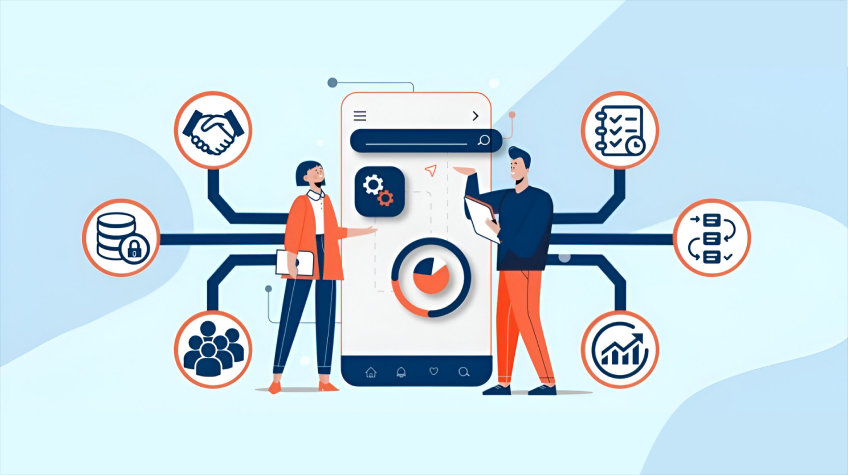
Enterprise mobile Apps help businesses work smarter, stay in touch, and perform faster. Mobile apps are now an integral tool that today’s businesses must use to enhance communication as well as productivity.
Mobile technology has turned into an integral aspect of businesses in the contemporary digital era. Mobile apps are assisting businesses of all sizes in streamlining in-house processes, enhancing collaboration, and delivering enhanced customer support. Enterprise mobile apps are the engines that smart companies are quietly running with, even though the customer-facing applications take most of the attention.
Enterprise mobile app development involves creating apps that are deployed within an enterprise. These programs enable operations such as employee coordination, workflow automation, scheduling of resources, and inventory management, among others. With the increase in mobile workforces, the requirements to have smooth communication, instant access to information, and work flexibility also increase.
In this article, let’s have a look at the top five business benefits of enterprise mobile app development and why companies should invest in it.
5 Best Benefits of Enterprise Mobile App Development

1. Improved Employee Productivity and Efficiency
Enterprise mobile applications enable employees to have access to the tools and information they require. It may be the update of the project material, the examination of client material, or the communication with a team member; this will go faster and more conveniently with a mobile application. For example, sales teams could use an app out in the field to ask about the real-time availability of inventory or customer files.
The field workers will be able to update reports or submit job completion forms immediately. They can complete tasks while on the move instead of waiting until they are back in the office. This flexibility decreases delays, improves communication, and also the overall productivity.
These apps relieve workers of manual work and enable them to do more valuable work by automating routine procedures. Teams can do more work in less time and with fewer mistakes.
2. Real-Time Data Access and Decision-Making
Data is usually used in making business decisions. However, when data gets trapped on office desktops or slows down with manual reporting, it loses its strength. Business mobile applications eliminate this by providing critical business information in real-time, anytime, anywhere. For example, a manager can have real-time access to sales numbers, individual employee performance, or production sticking points using the app.
In case of a supply chain problem, the apps will deliver an immediate notification. The leaders do not need to wait until they get emails or spreadsheets, but they can act on the spot. The businesses have flexibility with this real-time visibility. Decisions are quick, and they are made with confidence when there is a change in conditions. This instant response capability offers a serious competitive advantage to your business in competitive markets.
3. Enhanced Communication and Collaboration
A good business is based on sound communication. However, in businesses with remote departments and numerous branches or firms where workers are out in the field, communication may be lost. Mobile apps in an enterprise ensure that everyone stays connected and is at the same level. Such applications give a dedicated system to communicate, share files, notifications, and team notifications. It may be a construction firm relaying information to the site reports, a healthcare team communicating about patients, or a retailer sending information to employees at the stores; mobile applications make sure the information is conveyed quickly and clearly.
Some applications even have video conferencing, task management, and project management. This builds a seamless software environment, which enables teams to work in real-time regardless of their locations. Improved communications result in fewer misunderstandings and productive team efforts.
4. Streamlined Operations and Workflow Automation
Enterprise mobile applications make complex processes much easier, as workflows are automated. Employees are not forced to work with paper forms, send emails, and perform calculations in spreadsheets because these functions are done directly in the app. As an example, HR teams can use an app to onboard new employees, manage attendance, or leave requests. The warehouse personnel may scan the stock using the phone and update the stock levels. The managers can approve a timesheet or purchase order with a single tap.
Automation is not only time-saving but also accurate. It minimizes the chances of manual mistakes, oversight of any steps, and negligence of approvals. Moreover, the businesses have increased clarity of processes, which they can use to bring about evaluation. This will make operations leaner, more efficient, and more dynamic.
5. Better Security and Control of Business Data
It has become essential to protect the company data because workers have many devices and may access sensitive company data remotely. Enterprise mobile apps provide security capabilities that will keep your data secure and in control. Custom applications are capable of implementing secure login procedures, data encryption, and access through roles. IT departments have an opportunity to manage devices remotely, modify software, and block illegal access.
Compared to third-party applications, enterprise apps are also owned by the businesses, which makes them independent. Where regulatory oversight is high, such as in the finance, healthcare industry, or in the legal field, compliance is important. This guarantees secure movement of sensitive data and prevents expensive security breaches or fines.
Why Businesses Should Invest in Enterprise Mobile Apps
1. Customization and Scalability:
Enterprise apps are made according to your needs as a business. They can grow alongside your team, functions, and features. This means that the app can be enhanced with new modules, additional people to use it, and functions as your business grows, without the need to start a new one every time your business grows or changes
2. Integration with Existing Systems:
The enterprise mobile applications can be easily integrated with your existing product, such as ERP, CRM, HRMS, or accounting systems. The seamless linkage achieves consistency in data within departments. It saves time, prevents duplication, and makes it more efficient because users can access all the important systems on a single convenient mobile platform.
3. Employee Satisfaction:
Employees can do their job more easily and quickly when they can get the tools they require. Enterprise apps enhance everyday processes, eliminate frustration, and provide employees with a feeling of independence. This increases job satisfaction and enhances engagement, developing a more motivated and productive workforce in a broader sense.
4. Competitive Advantage:
Companies that adopt mobile-first approaches remain competitive. They are quicker at responding to customer demands, quicker in adjusting to market changes, and provide high-quality service.
5. Cost Savings in the Long Run:
Although developing a unique enterprise application might appear to be a costly venture at first, it can save costs in the long term. The operations cost can go down considerably in the long term with faster processes, fewer errors, and better productivity.
Industries That Benefit Most from Enterprise Mobile Apps

- Manufacturing: Teams involved in the manufacturing process monitor the production chains, equipment, as well as supply chains in real time.
- Retail: Retail shops use applications to manage the inventory, reports of the sales, tasks, and loyalty programmes.
- Healthcare: Applications contribute to security in healthcare by helping staff manage patients, offering consultations even remotely, and accessing medical records.
- Construction: The construction workers use mobile devices in tracking the projects, examining the equipment, reporting, and time recording.
- Logistics: Route planning, delivery tracking, fleet management, and real-time updates serve the logistics sector.
Enterprise apps provide efficiency, better communication, and productivity across all industries, as they place key business processes directly on mobile devices.
Conclusion
In conclusion, Enterprise mobile app development is changing the way business is being conducted, communicated, and developed. These apps do not just provide basic functionality; they support employees, facilitate faster decisions, promote daily activity automation, and protect data. As a startup or a large corporation, a well-designed enterprise app investment can bring you sustainable business value.
Developing a mobile-first application, which is in line with the objectives of your business, allows you to remain competitive in the current digital economy. Businesses are going mobile, and it is time to ensure that your company adapts to the reality.






